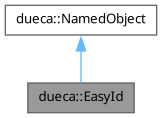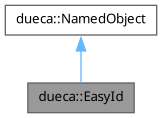Internally in DUECA, some objects need an id, but cannot derive from NamedObject, because they could be initialized automatically before the ObjectManager. More...
#include <EasyId.hxx>


Public Member Functions | |
| ObjectType | getObjectType () const |
| Needed for NamedObject. | |
| EasyId (const char *entity, const char *name, int part) | |
| Constructor. | |
 Public Member Functions inherited from dueca::NamedObject Public Member Functions inherited from dueca::NamedObject | |
| const std::string | getEntity () const |
| Returns the "entity" part of the name. | |
| const std::string | getClass () const |
| Returns the "class" part of the name. | |
| const std::string | getPart () const |
| Returns the sub-entity or "part" part of the name. | |
| const NameSet & | getNameSet () const |
| This returns the complete name set. | |
| const GlobalId & | getId () const |
| This returns the id. | |
Additional Inherited Members | |
 Protected Member Functions inherited from dueca::NamedObject Protected Member Functions inherited from dueca::NamedObject | |
| NamedObject (const GlobalId &id) | |
| Reserve for AssociateObject. | |
| NamedObject (const NameSet &ns) | |
| Normal constructor, protected, because it has no use to create a NamedObject by itself. | |
| virtual | ~NamedObject () |
| Destructor. | |
Detailed Description
Internally in DUECA, some objects need an id, but cannot derive from NamedObject, because they could be initialized automatically before the ObjectManager.
A pointer to an EasyId can then be used, and the EsyId is instantiated later.
In some cases, having a class that derives from EasyId can be useful in application code. Only do this when you have an object that is not a Module, and also not associated with a (single) Module, but that still needs some Module-like capabilities, such as accessing a channel.
When having classes that are clearly associated with a dueca::Module (helper classes to handle a specific channel entry or the like), instead use dueca::AssociateObject, which can "borrow" access to the Module's name and identity.
Member Function Documentation
◆ getObjectType()
|
virtual |
Needed for NamedObject.
Implements dueca::NamedObject.
The documentation for this class was generated from the following file:
- /home/abuild/rpmbuild/BUILD/dueca-4.2.5-build/dueca-4.2.5/dueca/EasyId.hxx